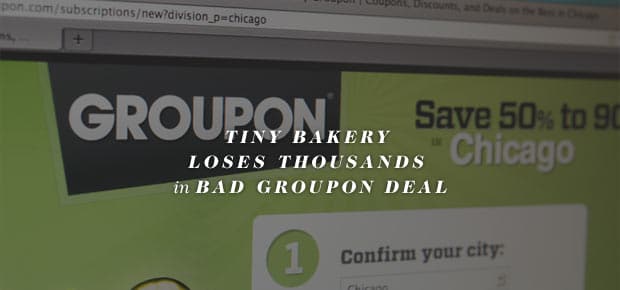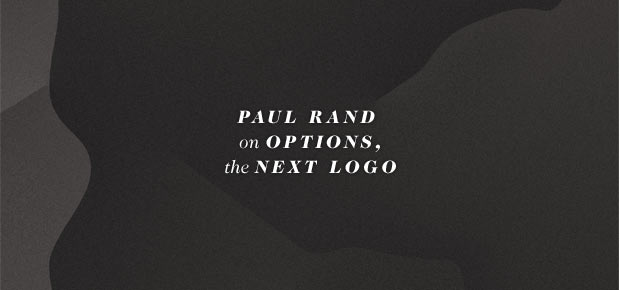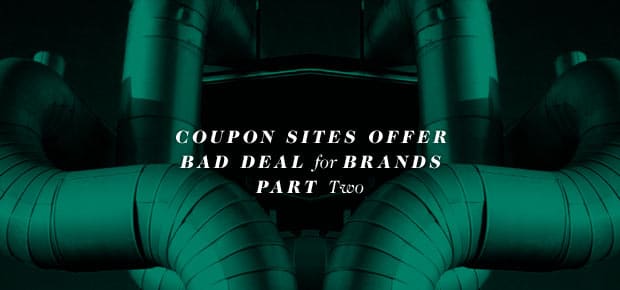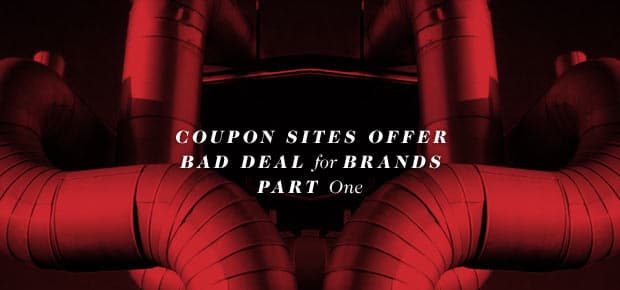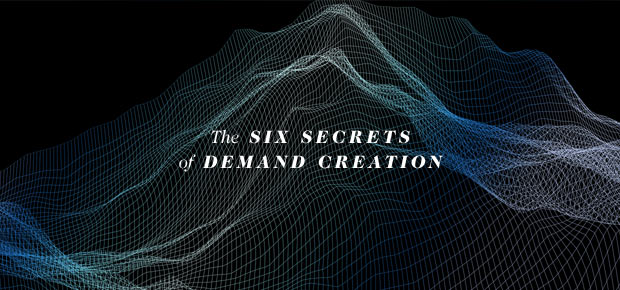The real payoff in this book is the explanation of the ten “engines” of remarkable products. This is light-years beyond the fumbling attempts to explain why certain companies are the favourites that some “branding experts” roll out. Going beyond shallow statements about branding, this book gets into the mechanics of the experiences that people talk about.
Tag: Sales
Tiny Bakery Loses Thousands in Bad Groupon Deal
This BBC article reports that a Berkshire bakery has nearly been run out of business by a overly “successful” Groupon deal. The owner, Rachel Brown, described these coupon sites well:
Without doubt, it was my worst ever business decision.
Groupon had this to say to the BBC:
We are actively engaged with all our partners at every stage.
Uh-huh. From now on this bakery will be known as that one bakery that almost went out of business, but stayed alive by cutting corners and bringing in unqualified labour. Though caveat emptor applies here, I reckon. Advertisers are buying an advertising service from the coupon sites, though it may not feel like it.
Paul Rand on Options, the NeXT Logo
I asked him if he would come up with a few options, and he said, ‘No, I will solve your problem for you and you will pay me. You don’t have to use the solution. If you want options go talk to other people.’
— Steve Jobs, talking about Paul Rand
I’ve heard this before, and while I like the sentiment, I can’t help but think it’s either incredibly pompous or ignorant. I think I’d balance it off of some of the things that Michael Beirut says in this Creative mornings talk, where he points out that his clients aren’t any different from anyone else’s, and that while some people think that Pentagram clients self-select, they’re the same random mix of people that anyone else gets. Those clients aren’t going to swallow such an egotistical line, even if you’re the top designer in the world.
Still, the idea that Paul Rand has, that he’s going to understand your problem and solve it for you (and so there is only one correct answer), is a pretty nice one for those of us that design corporate brand identities. And why not, it seems pretty logical.
When Paul Rand presented his NeXT logo, he did it with a custom-made book (scroll to the bottom of the page, look under “presentations”) that walked Steve Jobs through the problem, and the thought process that went into designing the logo (more scans of the book are available at Imprint). Which is absolutely how you’d have to do it, if you’re only presenting the one concept: you’re telling the story about how the identity is fated to look like this, and not like anything else. If you can get that story right, presenting one option will work. But it might help if you’re not quite as brusque with the client as Mr. Rand is quoted as being.
As an aside, I happen to think that the NeXT logo is poorly done.
Coupon Sites Offer a Bad Deal for Brands, Part Two
Cornell University recently published a paper about daily deal sites, and the negative effects they have on your brand. The key takeaways:
- There’s lots of word-of-mouth generated about your brand and it’s offer;
- You get a big boost in the number online reviews of your business after the offer runs;
- Your average online review score falls 10% as a result of your offer.
Lots of people talk about your brand, but on average they think less of you than before you ran the offer. And for the privilege, you give up 75% of your revenue!
The whole thing is available at Cornell. But here’s a good summary:
Daily deal sites have become the latest Internet sensation, providing discounted offers to customers for restaurants, ticketed events, services, and other items. We begin by undertaking a study of the economics of daily deals on the web, based on a dataset we compiled by monitoring Groupon and LivingSocial sales in 20 large cities over several months. We use this dataset to characterize deal purchases; glean insights about operational strategies of these firms; and evaluate customers’ sensitivity to factors such as price, deal scheduling, and limited inventory. We then marry our daily deals dataset with additional datasets we compiled from Facebook and Yelp users to study the interplay between social networks and daily deal sites. First, by studying user activity on Facebook while a deal is running, we provide evidence that daily deal sites benefit from significant word-of-mouth effects during sales events, consistent with results predicted by cascade models. Second, we consider the effects of daily deals on the longer-term reputation of merchants, based on their Yelp reviews before and after they run a daily deal. Our analysis shows that while the number of reviews increases significantly due to daily deals, average rating scores from reviewers who mention daily deals are 10% lower than scores of their peers on average.
Coupon Sites Offer a Bad Deal for Brands, Part One
I am pretty biased against coupon sites. My wife subscribes to all of them, which is cool. But I don’t like them from an advertiser’s point of view.
My wife bought a deal from a site a few weeks ago. She was pretty excited when she told me about it, and we shook our heads in wonder, “How can that business afford to do this?” Then she got this email:
——– Original Message ——–
From: [email protected]
Subject: [Auto-Reply] Cupcakes
Date: 14 Oct 2011 12:01:29 -0700Thank you for your interest in Little Miss CupCake
Unfortunately because of the issue we experienced with dealfind.com we are not accepting ANY orders for the time being, and we will not be accepting any of the Dealfind vouchers purchased.
We apologize for the inconvenience.DEALFIND ISSUE
Dealfind oversold passed what I had asked them to,
and then would not turn off the deal when asked to do so.
To top that off, they refused to answer my calls and emails as the deal was going on.They added free delivery to the deal, which was not the case.
I had told them there was no free delivery allowed.
I gave them rates and delivery restrictions, which they refused to put in my ad.
They also stated that the vouchers could be redeemed all at once,
which is not something I agreed to.I do sincerely apologize for the inconvenience this may have caused you,
and I encourage you to ask for a refund (Dealfind.com will issue full refunds within 30 days of purchase, I personally cannot issue refunds, as Dealfind has all of the funds)
This is just an awkward mess. How much of this is true, I don’t know. But it looks like a ridiculous offer went out and sold like crazy. The advertiser claims that Dealfind basically just invented the whole offer against his wishes, then disappeared on the day it went out. Now customers are left to sort out the mess with Dealfind, as the bakery has enough to worry about, trying to repair it’s brand from this mess.
I don’t like these sites primarily because the math doesn’t work out very well. Advertisers have to offer steep discounts (roughly 50% off), and then they only get 50% of the proceeds from the deal. So you’re only getting about 25% of the regular price for your product/brand.
Then think about the type of clients this brings the brand: either existing customers already familiar with your brand and just picking up a good deal; or new customers that are often unfaithful to your brand as they seek out new deals from your competition. Now you realize you’ve just paid 75% for a pretty unattractive customer. Can your margins bear 1000 of these customers?
Tomorrow I’ll get into some research done about these sites, and the actual effects these offers have on your brand.
The Six Secrets Of Demand Creation
Adrian Slywotzky has a nice little teaser on Fast Company for his upcoming book “Demand: Creating What People Love Before They Know They Want It.” This bit really resonated with me:
5. Build a Steep Trajectory of Improvement
A product’s launch is merely the first step in a series of attacks upon the indifference of the market. On launch day, great demand creators jump into the next phase by asking themselves: How fast can we get better? Every improvement they make will unlock new layers of demand, and leave less open space for imitative competitors.
I’ve seen this happen many times. Businesses get so caught up in their daily operations that they stop innovating and improving. The really successful business never seem to loose that desire to offer something even better.
Hat tip, Ron Tite.
Networking using guilt
Today I bumped into an old business associate while shopping at Costco with my family. I haven’t seen or heard from him in over three years, though I still receive his weekly emails that I can’t seem to unsubscribe from.
Our conversation centered on three main points:
- He’s not busy.
- He wants to know if I have any work I could send his way.
- Maybe if I send him some work, he’ll reciprocate.
This would not build a strong business relationship! While relationships should be quid pro quo, it’s imperative that they’re genuine. Do you want work (or anything else) from me? Then take an interest in me. Put me in your debt. Be a nice person, genuinely. Make me like you.
Do not imply that if things don’t turn around for you soon, you’ll have to sell your house.
